This post may contain affiliate links. Please see our disclosure policy.
Canning lemonade is an easy way to make sure you always have a refreshing beverage on hand when you need it. Store your jars in the pantry, and quickly pour the contents over ice for a cool drink anytime.
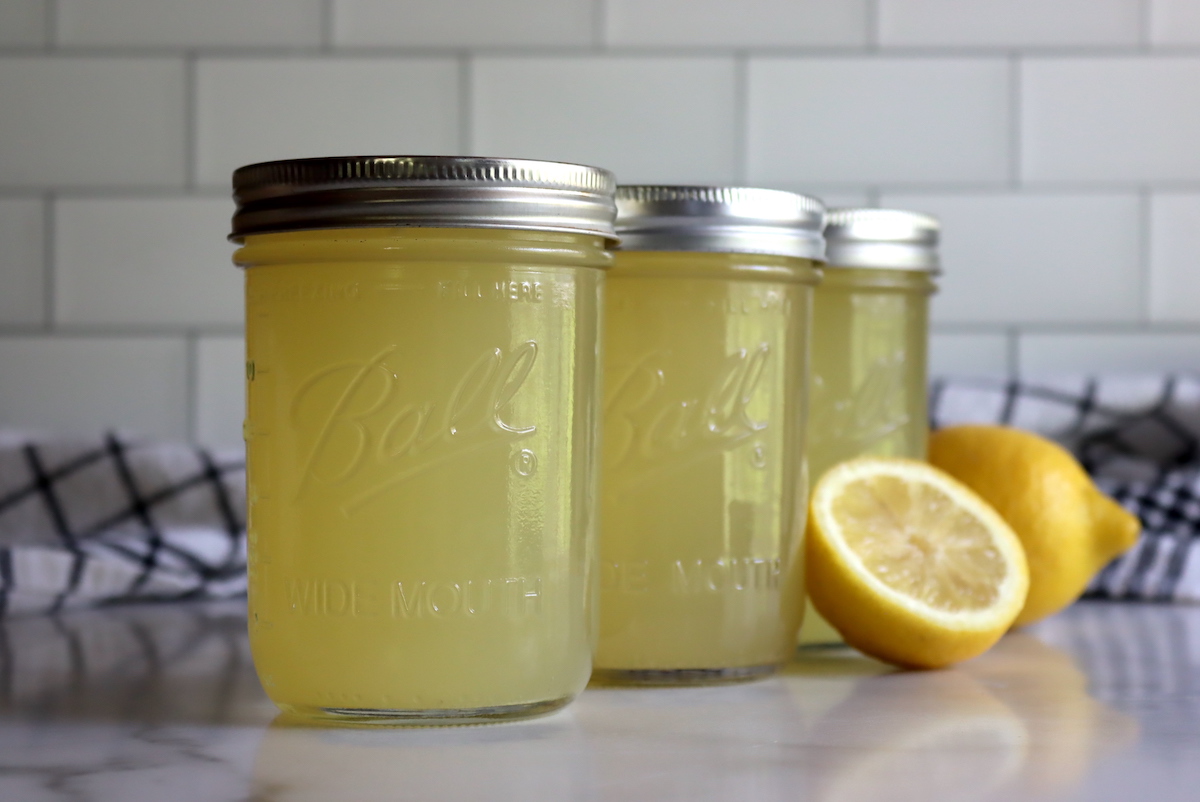
Homemade lemonade is so much better than storebought powders and concentrates, but it’s a pain to make when you just want a cold drink now.
When I’ve been working all afternoon in the garden, and I come in looking for a quick drink, I just want something cold and refreshing in a hurry. I don’t want to be meddling around with melting sugar on the stove and juicing lemons.
Even if I did have the patience to make a batch fresh right in the middle of summer, lemon season is in the winter…and all the best lemons are harvested in January!
By canning homemade lemonade (and lemonade concentrate), I can take those fresh winter lemons and transport them in time to my summertime kitchen. I get the taste of freshly made lemonade at a moment’s notice. All you have to do is remember to take a jar of lemonade off the pantry shelf and pop it in the refrigerator before I go out to work in the garden. It’ll be right there waiting for you when you need a break.
If you’re canning for a crowd, then canning lemonade concentrate works even better. A single half-pint jar of lemonade concentrate will make three pints of fresh lemonade when added to cold water.
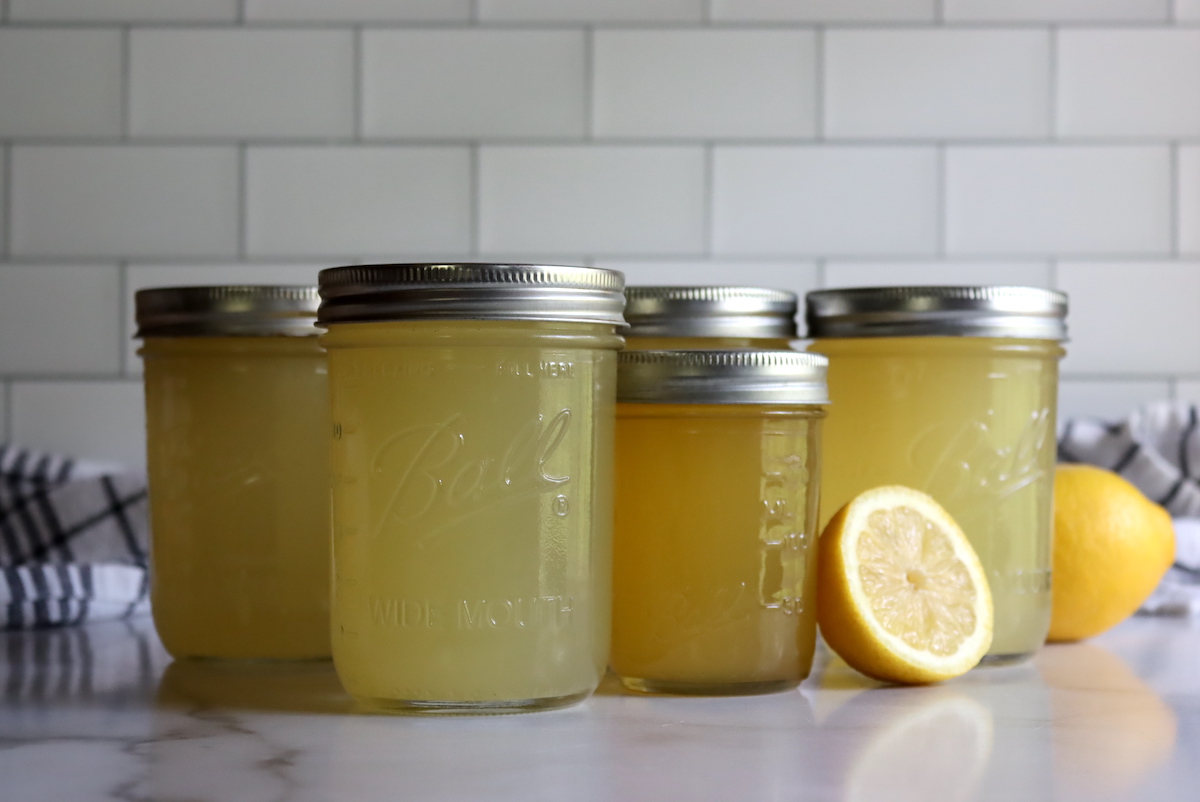
Canning Lemonade vs. Lemonade Concentrate
You can either can ready made lemonade in a jar, or lemonade concentrate. Both work out wonderfully, and it really depends on your family’s needs.
Most people opt to can lemonade concentrate simply because it uses fewer jars than canning ready-made lemonade. It doesn’t take up extra space on the pantry shelf just storing water, and you still get all the flavor of fresh lemonade at a moment’s notice. A single half-pint (1 cup) jar of lemonade concentrate is added to 5 to 6 cups of water to make roughly 3 pints of fresh lemonade.
Personally, I like the convenience of coming into a ready-made jar of lemonade just waiting for me in the refrigerator. I rarely need 3 pints of lemonade at once, but I absolutely love having a single cold pint ready to go in the middle of a hot day.
I have plenty of jars, and I don’t worry about canning the extra water. In fact, I actually can water for emergencies, and I always keep around 50 quarts of plain water canned in my basement for power outages and other times when the well pump just isn’t working. If you’re in the city, it’s not a bad idea either, as boil water notices happen all the time, and it’s easy enough just to open up a jar of home canned water when you want a drink.
Since I’m already storing water in jars for emergencies, I don’t think it’s a big deal to store ready-made lemonade for the same purpose. I’m happy to have the extra water on hand when I need it, and I don’t mind if it uses up extra jars.
Either way, the choice is up to you. The canning instructions for lemonade and lemonade concentrate are the same, the only difference is how much lemon and sugar goes into a batch. The process starts the same, and the only real difference is one is diluted by adding water before canning, and the other one afterward.
Ratio for Lemonade
The exact ratio for homemade lemonade is up to you, at least to an extent.
If you’re canning plain lemonade, you’ll need to use at least 1/4 cup of fresh lemon juice per pint jar. That’s to ensure that the mixture is acidic enough for canning. You cannot can sugar water with a “hint of lemon,” it does need to have a good bit of fresh lemon juice in it to ensure the pH drops low enough for canning.
The most commonly accepted basic recipe for lemonade is:
- 1 cup fresh lemon juice
- 1 cup sugar
- 6 cups water (plus ice for serving)
To make lemonade concentrate for canning, you simply dissolve equal parts of lemon juice and sugar by volume. You’re basically making a lemon juice simple syrup here, with 1 cup lemon juice and 1 cup sugar.
To make ready-made lemonade for canning, you’ll want 1 cup fresh lemon juice, 1 cup sugar, and 6 cups water. That should yield about 4 pints of ready-made lemonade, and each pint will have about 1/4 cup of lemon juice.
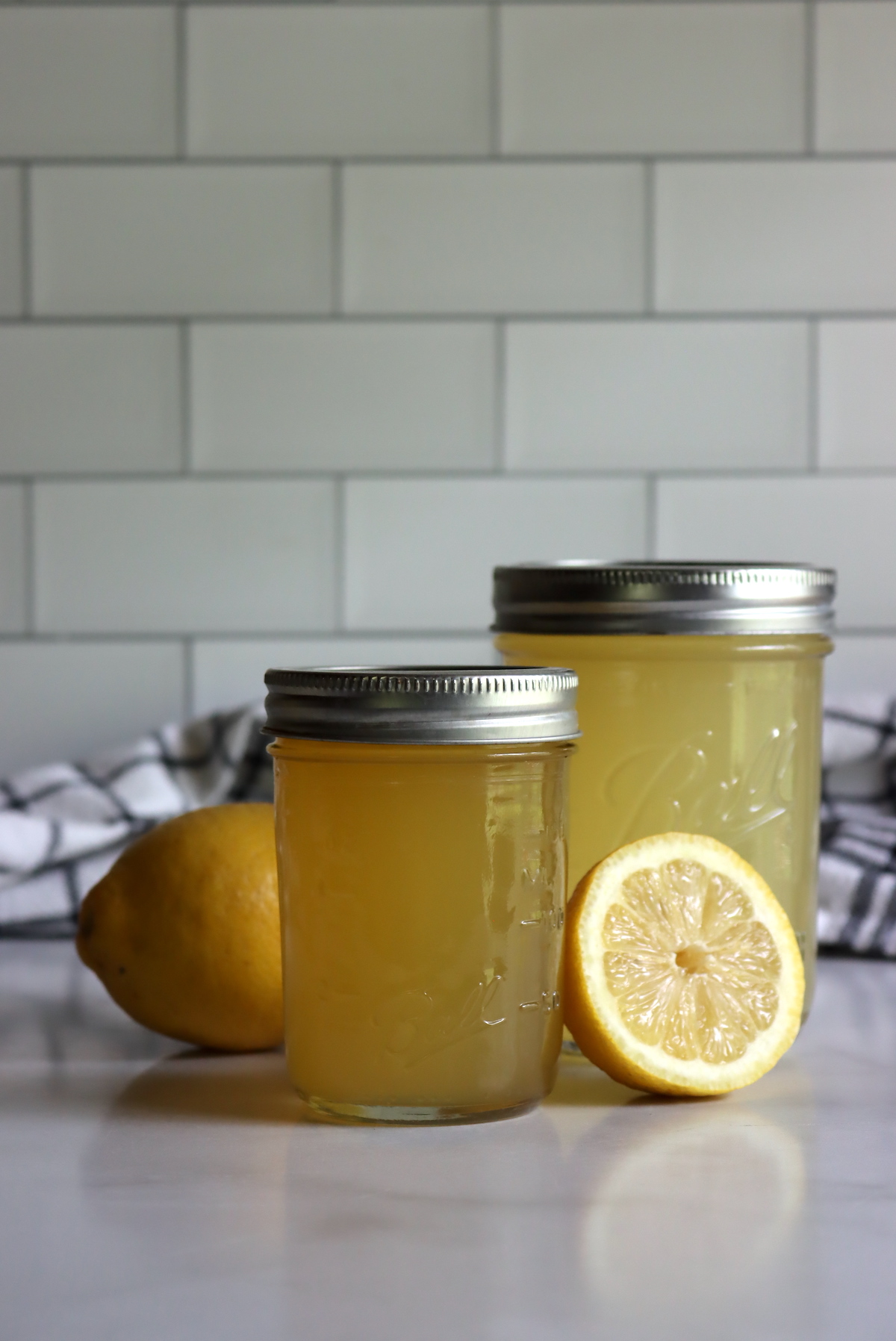
Making Lemonade for Canning
Most canning recipes specify “bottled lemon juice,” but this one’s different. It can be made with bottled lemon juice, but it tastes MUCH better if made with fresh lemon juice. The reason bottled lemon juice is often used in canning recipes is that it’s standardized for acidity, and fresh lemon juice can be slightly less acidic than bottled.
This recipe is designed to take that into account, and the mixture will still be acidic enough for canning with fresh lemon juice.
Bottled lemon juice can get bitter and take on a “tinny” taste in storage, and it won’t taste nearly as good. Fresh lemon juice, especially if the lemons are juiced right before canning, is exactly what you want when canning lemonade.
Start by juicing the lemons, and then put the juice through a fine mesh sieve to remove any seeds and pulp. The lemon pulp can make home-canned lemonade bitter, so you’ll want to filter that out.
Measure the resulting lemon juice, and add equal parts sugar by volume to make lemonade concentrate.
(An average lemon yields about 1/4 cup of fresh juice, but they can vary considerably, so measure before canning.)
To make ready-made lemonade, you’ll want to add about 6 cups of water per cup of lemon juice too. You can reduce this amount to make a stronger lemonade if you’d like, but do not increase the amount of water added beyond 6 cups water per cup of lemon juice.
The sugar is not required for preservation and is just in there for flavor. Feel free to reduce or increase the sugar as you please. Honey or maple can also be used in place of plain white sugar.
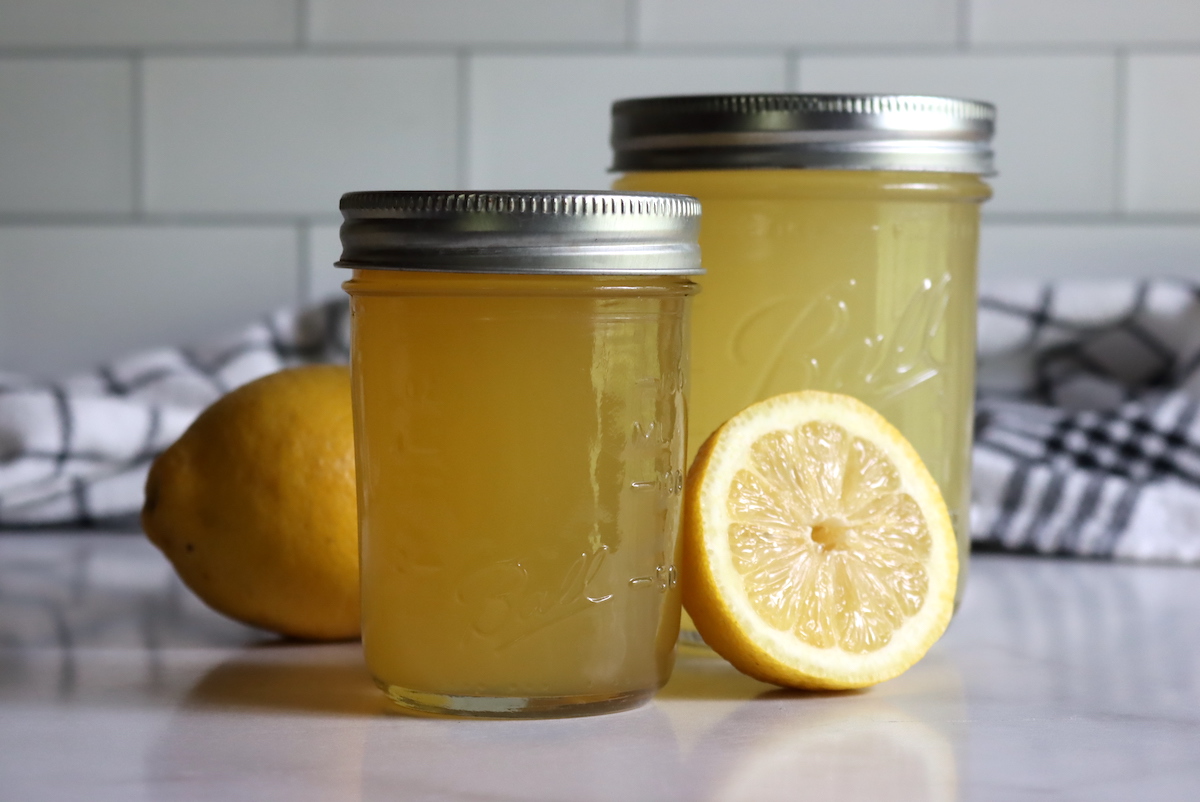
Tips for the Best Home Canned Lemonade
For the absolute best home canned lemonade, be sure to:
- Strain the pulp, as it can turn bitter during canning
- Use fresh lemon juice (not bottled)
- Test your recipe first. Lemonade is personal, some like more sugar, some more lemon, etc.
The last thing I’ll suggest is zesting the lemons into your sugar first, and allowing the zest to infuse into the sugar for an hour or two before continuing. Lemon zest has an incredible lemon flavor, and the sugar can pick up the intense lemon oil flavor from the zest. It’ll make your home canned lemonade taste intensely of lemon…without all the extra tartness from more lemon juice.
Simply zest the lemons (organic if possible) and mix the zest with sugar.
It is important to strain out the zest before canning, but you can do that simply by dissolving the sugar in your lemon juice and then straining everything before canning.
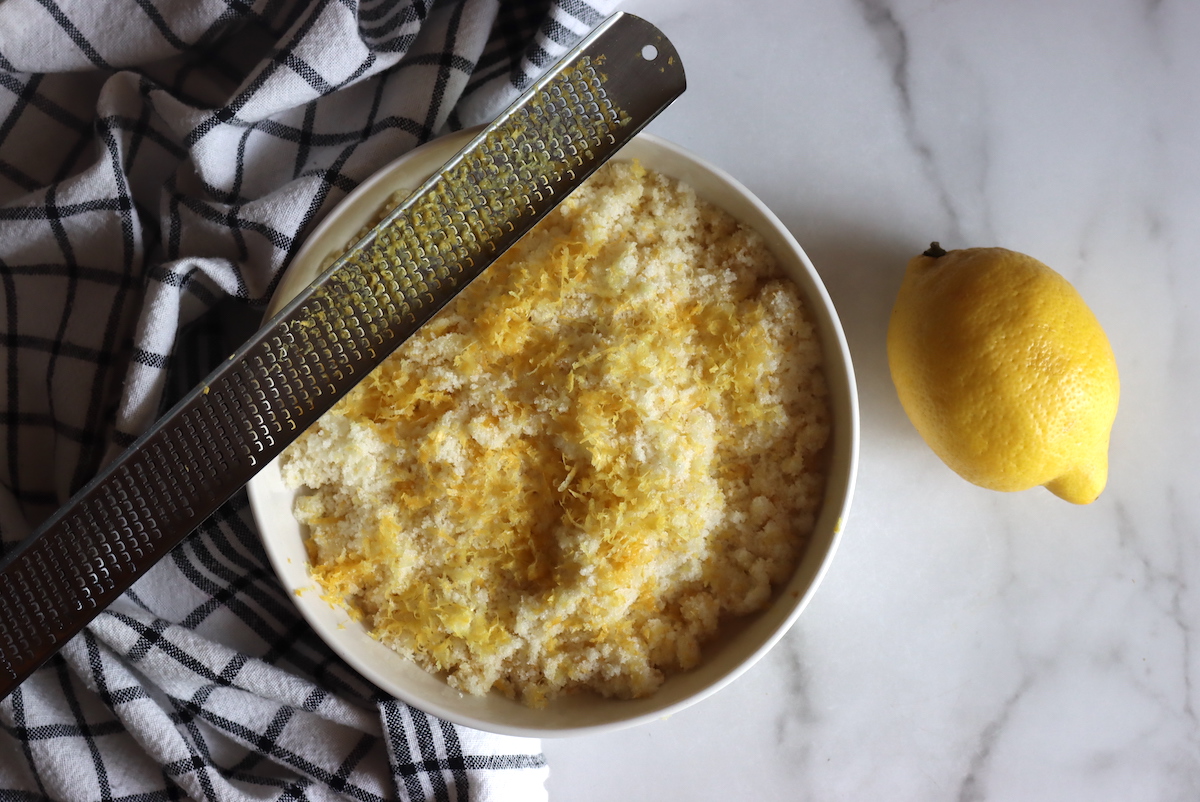
Canning Lemonade (& Concentrate)
Whether you’re canning lemonade or lemonade concentrate, the instructions and process times are the same.
(Reminder, do not use less than 1/4 cup of lemon juice per pint jar, or 1/2 cup per quart.)
Prepare a water bath canner, jars, lids, and rings before beginning. The canner should be preheated for hot pack, and it should be simmering at around 180 to 190 F when the jars are loaded.
Lemonade and lemonade concentrate can be canned in half pints, pints, or quart jars.
Strain all the ingredients into a saucepan and gently warm the mixture to around 190 F. This should be barely simmering, but not boiling. Boiling the lemonade at this point will cause the natural pectin in your lemon juice to set, which can cause unsightly clumping in the jars (it’s still safe to drink if that happens, it just looks funny).
Ladle the hot (but not boiling) lemonade into canning jars, leaving 1/4 inch headspace.
Seal the jars with 2 part canning lids and process in a water bath canner.
Half pints, pints, and quarts are processed for 10 minutes below 1,000 feet in elevation.
Altitude adjustments for canning lemonade – Between 1,000 feet and 6,000 feet, process for 15 minutes. Above 6,000 feet, process jars for 20 minutes.
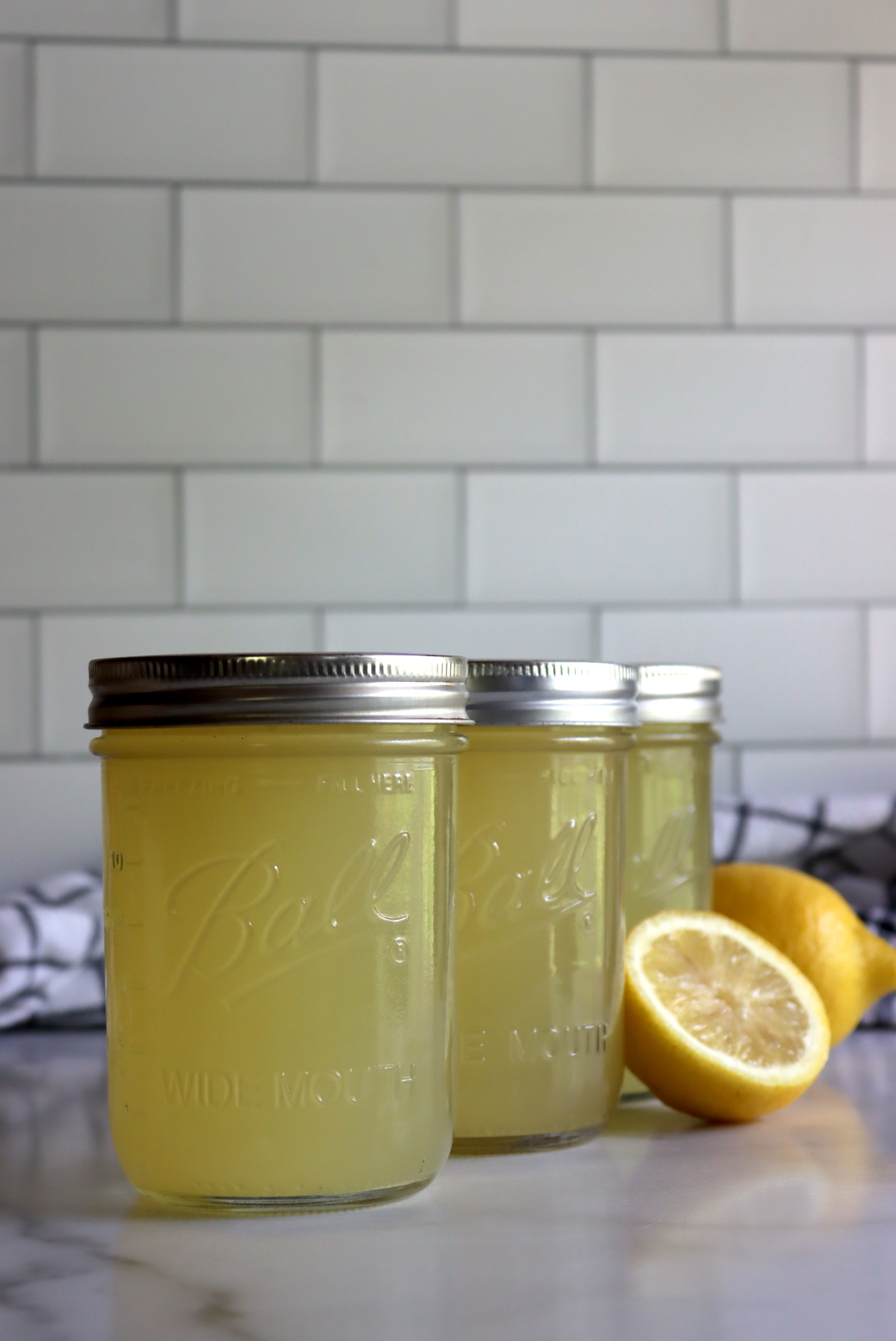
Lemonade Canning Variations
This basic lemonade recipe is a simple, no-fuss way to can lemonade for your pantry shelf.
There are a number of other variations in canning books that include fruit puree from other fruits. The canning recipe for strawberry lemonade concentrate in the Ball Book of Home Canning is probably the most well-known.
Be aware that if you add fruit puree to your lemonade, the canning time is considerably longer, and it’s not tested for canning in jars larger than pints. The fruits added should all be acidic enough for canning on their own as well.
If you add fruit juice (instead of puree), then you should still be able to use this recipe, provided the fruit juice is acidic enough for canning. (Ie. Watermelon juice is not acidic enough for canning.) Good choices would be berry juices, cherry juice, or other high acid flavorful juices that are approved for canning on their own.
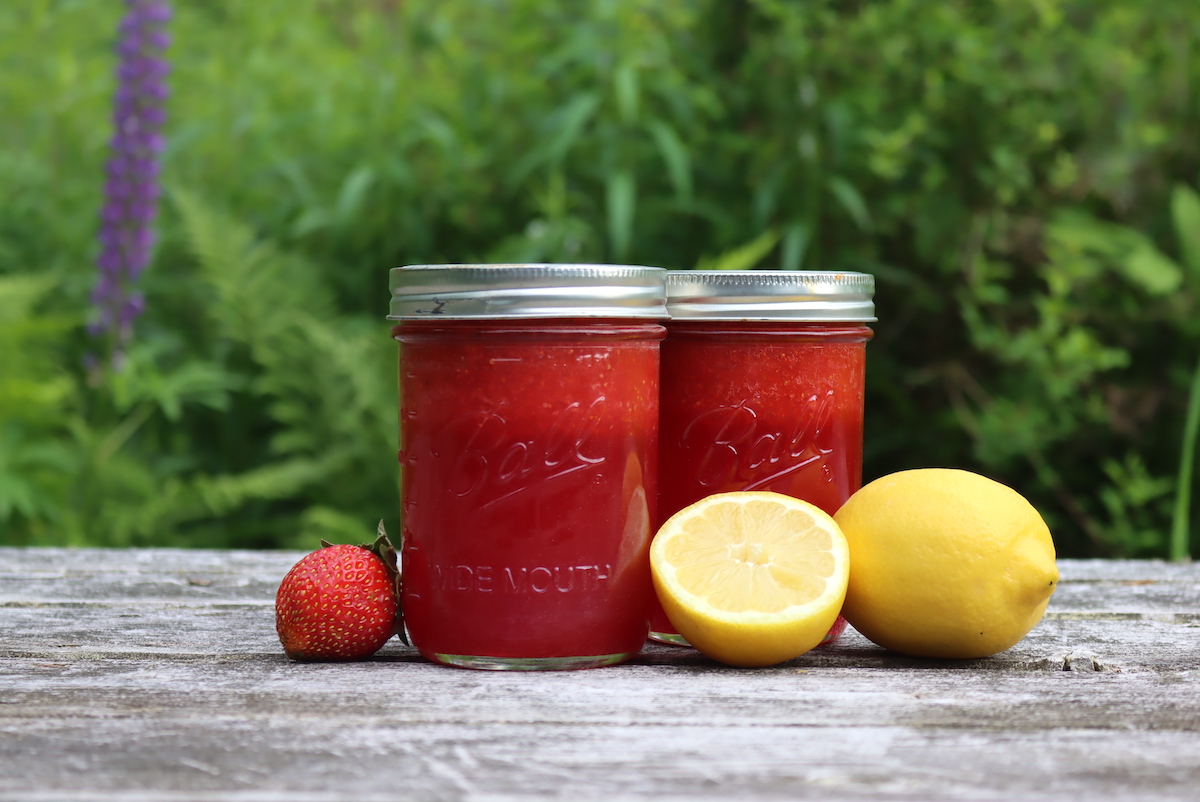
Lemon Canning Recipes
Looking for a few more ways to preserve lemons?
- Canning Lemons (3 ways)
- Freezing Lemon Juice
- Preserved Lemons (Salt Preserved Lemons)
- Lemon Wine
- Limoncello (Lemon Liqueur)
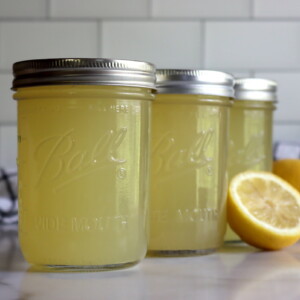
Canning Lemonade (& Lemonade Concentrate)
Equipment
- Wide Mouth Pint Mason Jars
- Wide Mouth Canning Lids
- Jar Lifter
Ingredients
Lemonade Concentrate Ratio
- 1 cup lemon juice, from 4 to 5 lemons
- 1 cup sugar
Lemonade Ratio
- 1 cup lemon juice, from 4 to 5 lemons
- 1 cup sugar
- 6 cups water
Instructions
- Prepare a water bath canner, jars and lids before beginning.
- If using lemon zest, start by zesting the lemons into the sugar. Stir and allow the mixture to sit for about an hour before proceeding. Remember that the lemon zest will need to be strained out before canning, and the easiest way to do that is to dissolve the sugar into the lemon juice and then strain the mixture before canning. (Zest is optional, but it adds amazing lemon flavor to the mixture. Use organic lemons if using the zest.)
- Juice the lemons. Strain the juice to remove pulp and seeds and then measure the resulting juice. For every cup of lemon juice, add 1 cup of sugar. (If canning lemonade instead of concentrate, also add 6 cups of water.)
- Gently warm the lemon juice and sugar mixture on the stove until it reaches around 190 F (do not boil).
- Ladle the hot but not boiling lemonade mixture into prepared canning jars, leaving 1/4 inch headspace. Seal with 2 part canning lids to finger tight.
- Half pints, pints, and quarts are processed for 10 minutes below 1,000 feet in elevation.
- Turn off the heat and leave the jars in the canner for an additional 5 minutes to cool slightly before removing them with a canning jar lifter to cool completely on a towel on the counter.
- Wait 12 to 24 hours, then check seals. Store any unsealed jars in the refrigerator for immediate use. Properly canned and sealed jars may be stored in the pantry. Refrigerate after opening.
Notes
Altitude adjustments for canning lemonade
Between 1,000 feet and 6,000 feet, process for 15 minutes. Above 6,000 feet, process jars for 20 minutes.Changing the Recipe
You can adjust sugar to your tastes, it's not required for preservation. Feel free to increase or decrease the sugar, or substitute in maple syrup or honey. Do not reduce the amount of lemon juice. When canning lemonade, you'll need a minimum of 1/4 cup of fresh lemon juice per pint jar. (Or 2 tbsp per half pint, or 1/2 cup per quart) Everything must be strained out before canning. Do not can lemonade with pulp, seeds, or zest. It needs to be a liquid for canning, without any solids.Nutrition
Nutrition information is automatically calculated, so should only be used as an approximation.
Summer Canning Recipes
Looking for more easy canning recipes that are perfect for summertime?
Drink Canning Recipes
Lemonade isn’t the only drink you can put in a jar!
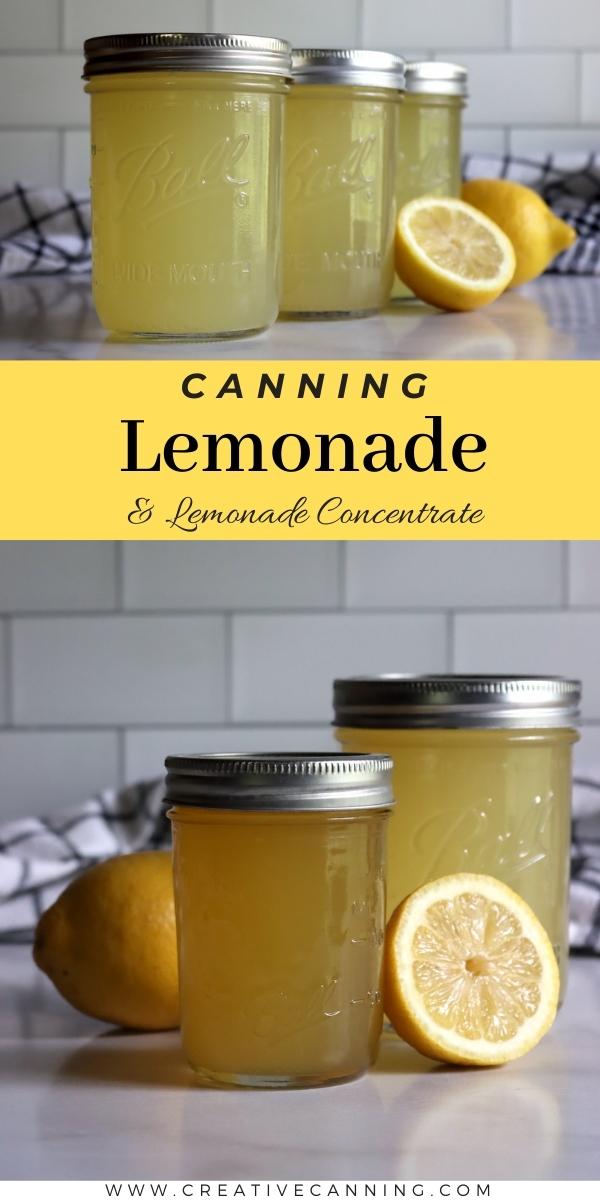
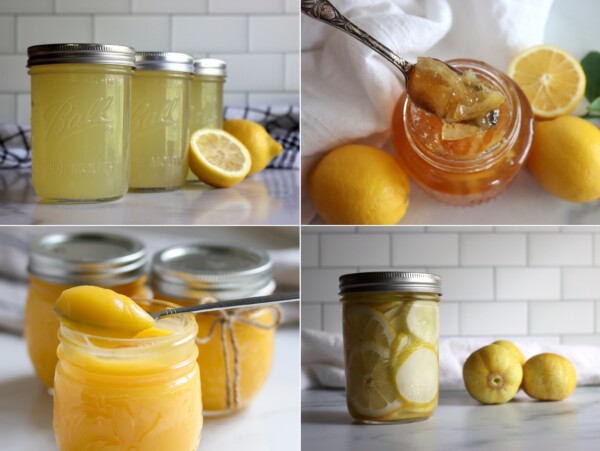
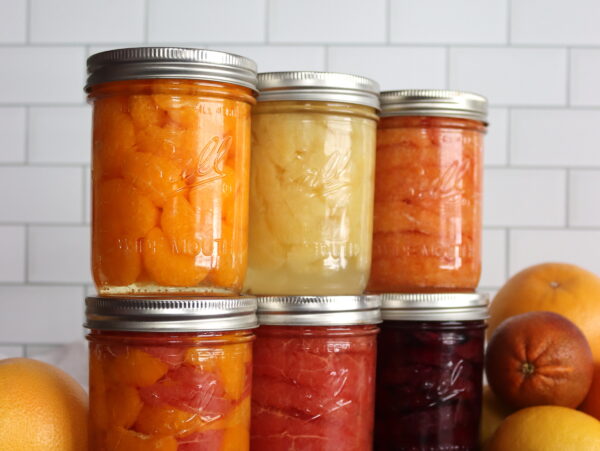
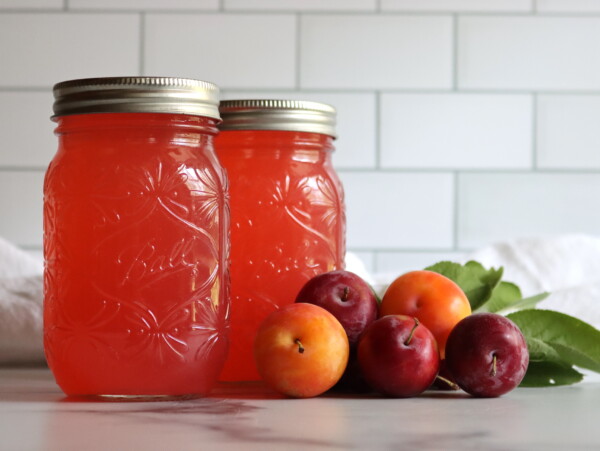
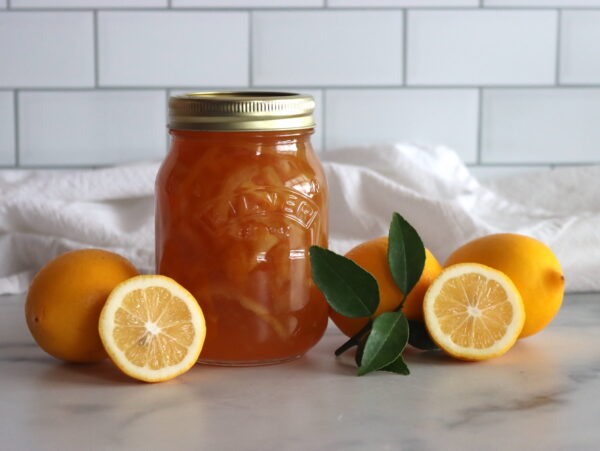
Hello. I made this recipe and the jars have settled for a while now. I’ve noticed a separation at the top and a more clear liquid at the bottom. I strained the juice using a sieve. Do you think it will be ok to store in my pantry? Thx
Separation is normal, and that’s just some of the natural fruit pectin settling out at the bottom. Totally fine. Just give it a shake or stir well when serving. That pectin sets in the heat of the canner, and so it went right through your strainer as liquid before it went into the jars. This doesn’t happen with all lemons, it just depends on your particular fruit.
what’s the shelf life
The jars will be safe to eat so long as they’re sealed (if canned properly). That said, quality starts to degrade after about 12-18 months, so you’ll want to use it within a year or so for best flavor.
Can you use a pressure canner to make this? If so, how?
If you want to process this in a pressure canner, you can, but it’s not strictly required. You can use your pressure canner as a waterbath canner to make this. But I imagine you’re specifically asking about canning it at pressure. If I was going to do that, I’d do 5 lbs pressure for 8 minutes. Be aware that the lemon juice will probably discolor at pressure, and it may look brown in the jars. Best of luck!
Hello! When prepping the jars to can, do I have to sterilize the jars by boiling them empty first, or is simply washing them with hot soapy water enough?
The NCHFP ruled that any canning recipe that’s processed for 10 minutes or longer doesn’t require sterilization of jars. Making sure they’re clean with hot soapy water is just fine for almost every canning recipe (including this one). There are some canning recipes out there for jams and jellies that are 5 minutes and with those, you do need to sterilize your jars. Or, do as I do, and just process them for 10 minutes instead and skip the messy sterilization step.
Would it still be safe to can if flavor syrups are added? I own a lemonade business and have recently been approached by a local store to sell our lemonade bottled/canned. I use torani syrup in some of my lemonade. I have been searching for a recipe that will allow the lemonade to be safe and good to sit in the fridge for more than a few days. a bonus if we can make our flavored lemonades.
Congratulations!
If you’re selling commercially, you might be asked by your local regulators to test the pH of your products to ensure that they’re below a pH of 4.6 for each batch. Many places require below a pH of 4.2 because in tropical conditions, or if something’s left in a hot car for a long time by accident, you need a bit more acidity. Anyhow, check into that, but a home pH tester isn’t that big a deal, and only takes a second to use once you get the hang of it.
But as to your question on Torani syrup, looking at their website, here’s what I can find for ingredients:
Pure cane sugar, water, natural flavors, sodium benzoate (to preserve freshness), potassium sorbate (to preserve freshness), citric acid.
All of that would be perfectly fine for canning. Check the individual labels on each flavor and make sure there’s nothing too crazy in there, but I cant imagine what they’d put in there that wouldn’t be fine for canning.
My family loves lavender lemonade. Could I make the lavender simple syrup and add it to the lemon juice and then still prepare as a concentrate?
Yup, that’d work just fine. Just make sure you don’t reduce the amount of lemon juice that ends up in each jar and it’ll can just fine.
Hi, I started in September, a little here and there. Today, I used your lemonade recipe. I had enough to fill 3 quart jars and 2 pint jars. I thought I would try to water bath all five together. Two of my quart jars seem to have broken. This has never happened to me before. What do you think happened? I might have had the lemonade at more of an inch space—was that it? Thank you for your input.
Assuming the jars weren’t damaged/chipped, what causes jars to break is thermal shock. My guess is the liquid in the quarts cooled too much before it went into the canner and the canner was already at a boil when you added them. To prevent this, make sure everything’s at a similar temperature when it goes into the canner (ie. the liquid is all very hot going into the jars) and the canner is only at a low simmer when you add the jars in (around 180F).
I am looking forward to making this, especially with no sugar or a sugar substitute. I don’t recall if you mentioned that non-organic lemons really need to be scrubbed in that may be one of the problems that people are getting with sediment in their lemon juice.
I really enjoy your site Ashley, Thank you
I am intrested to know if it is safe for me to use lemon basil in this concentrate. I would still use the lemon juice and the sugar, but would like to know if it’s safe if while the concentrate is heating up, can I add the lemon basil to it and let it steep and then strain it out before canning it. I love the flavor of lemon basil lemonade. And I have a ton of it in my garden.😊
Yup, that’s totally fine, just be sure to strain everything out but you can steep herbs in it as it’s heating up without issue. Just don’t decrease the amount of lemon juice, as you say. Enjoy!
Hi there! I made this lemonade concentrate a few months back. The color has now deepened and gone cloudy, but it smells great, and the seal was very tight when I opened it. Have you encountered this before?
Sometimes the pectin in the lemon juice can cause it to get cloudy, it just depends on your lemons. If the jars are sealed and it smells good you should be fine.
Wow. I have done a little canning years ago but nothing since the. I really enjoy lemonade so I look forward to canning some for summer. Thank you for sharing and your advice.
You’re quite welcome!
I have made lemonade with a lavender simple syrup to make lavender lemonade. Would the lavender simple syrup be safe to can?
If you use it to sweeten the lemonade in place of sugar (which I think is what you’re asking), then yes, that should be fine for canning provided you use the same proportions here and don’t reduce the total lemon juice in a batch size. The acidity in the lemon juice is what makes this safe for canning.
The lavender simple syrup isn’t safe to can on it’s own as it will have a neutral pH, but you can use a herbal syrup in place of sugar in this canning recipe.
Could you use limes instead of lemons? Or a mix of both?
Yes!
Is it safe to do limes in place or lemons, or do a mix of both?
Yup!
If I have frozen lemon cubes, can I thaw those and then can lemonade?
Yup, that should work just fine.
Hello. Once canned, how long is the concentrate shelf-stable?
It is safe to eat indefinitely, so long as it’s still sealed and was properly canned to begin with. After about 12-18 months, canned goods start to degrade and lose quality, especially if they’re exposed to light. But in terms of spoilage, it should last a very long time.
Would you give some direction on canniing Water? I would love to have someon hand for an emergency.
Yes indeed! I have directions for canning water on my other site here: https://practicalselfreliance.com/canning-water/
I’ll work on getting a post up here too, so it’s easier to find.
I strained it before putting in jars but it appears fine solids made it through the sieve that I see settling now that it is canned. Is that going to cause and issue?
No, that’s totally fine. You could even can whole sections of lemon in there without issue, really. At least safety wise.
Even if you filter it really well, you’re usually going to see sediment at the bottom because lemons are high in pectin, and that can precipitate out when they’re canned.
My juice turned brown in the canner, did I do something wrong?
Hmmm…maybe? I’m not honestly sure what might have caused that? My best guess is that the sugars caramelized in the canner. Did you use raw sugar or organic sugar? They have some molasses content that might have caused that.
I know a lot of recipes call for bottled lemon because with fresh lemons you can’t be sure they have a consistent ph level. Does that not matter here because the base ingredient is acidic?
Excellent question! In this recipe you can use fresh lemons because they’re so darn acidic. You don’t need that level of standardization when you’re working with this much lemon juice. (And it tastes a lot better with fresh.)
Can sugar substitutes be used?
The sugar is not there as a preservative, just for flavor, so you can substitute anything that’s safe for canning.
I would like to can Saville orange aide
You can do that if you do it as a concentrate (but probably not as prepared juice). Seville oranges (pH 3) are less acidic than lemons (pH 2), so you’d need to put them up as just juice (or juice and sugar), and then dilute to serve.